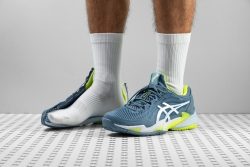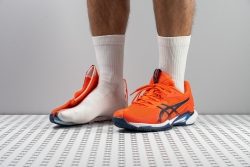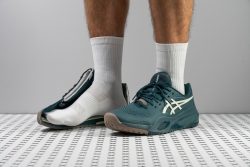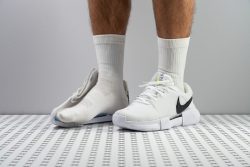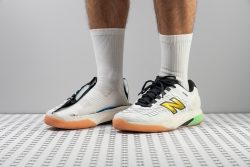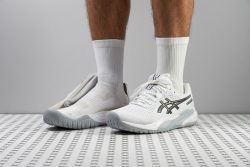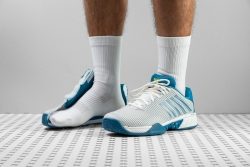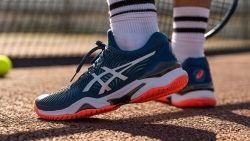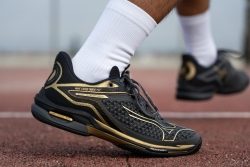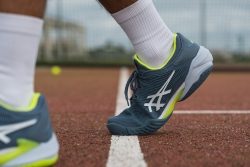7 Best Hard Court Tennis Shoes in 2025
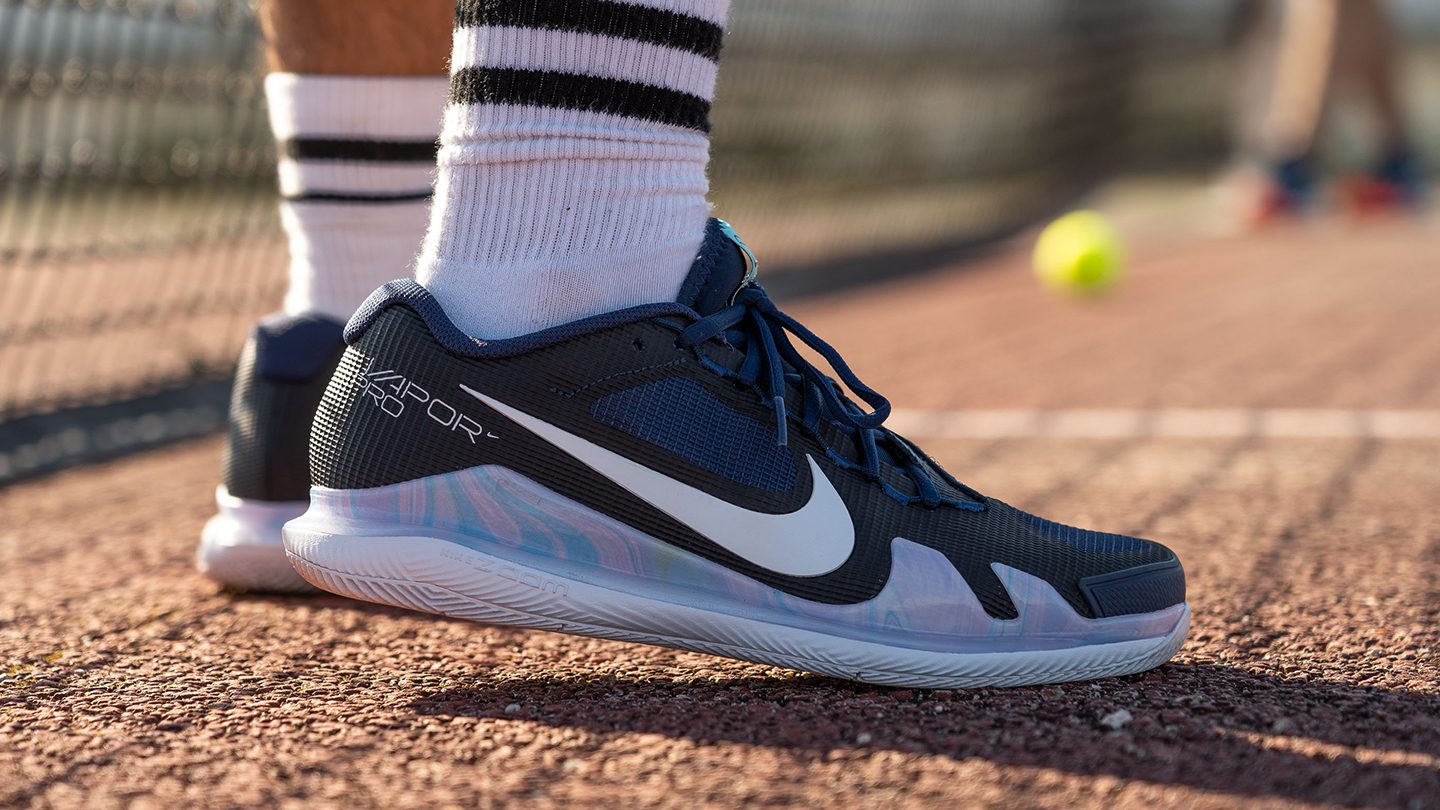
We buy shoes ourselves. We earn commissions when you buy through us, at no extra cost. Why trust us
The right hard-court tennis shoe will take the abrasiveness of this demanding playing surface while helping you get the most out of your games.
Whether you're looking for a light and speedy option, something more cushioned and supportive, or even the most affordable hard court tennis shoe, you came to the right place.
We have done all the necessary playtesting and analysed every nitty-gritty detail of hard-court tennis shoes to wrap it up in our top picks below.
How we test hard court tennis shoes
-
We don't accept free shoes from the brands or let advertisements influence our selection of top picks. We purchase every pair of tennis shoes with our own money to keep our opinions as unbiased as possible.
-
We spend hours on the court playtesting and scrutinising the shoes.
-
We cut the shoes in half in our lab and use various tools and devices to measure and test every little detail. This allows us to deliver an in-depth review that's backed up with more than 20 lab parameters for each hard-court tennis shoe.
The combined analysis helps us come down to the top choices.
Best hard court tennis shoes overall
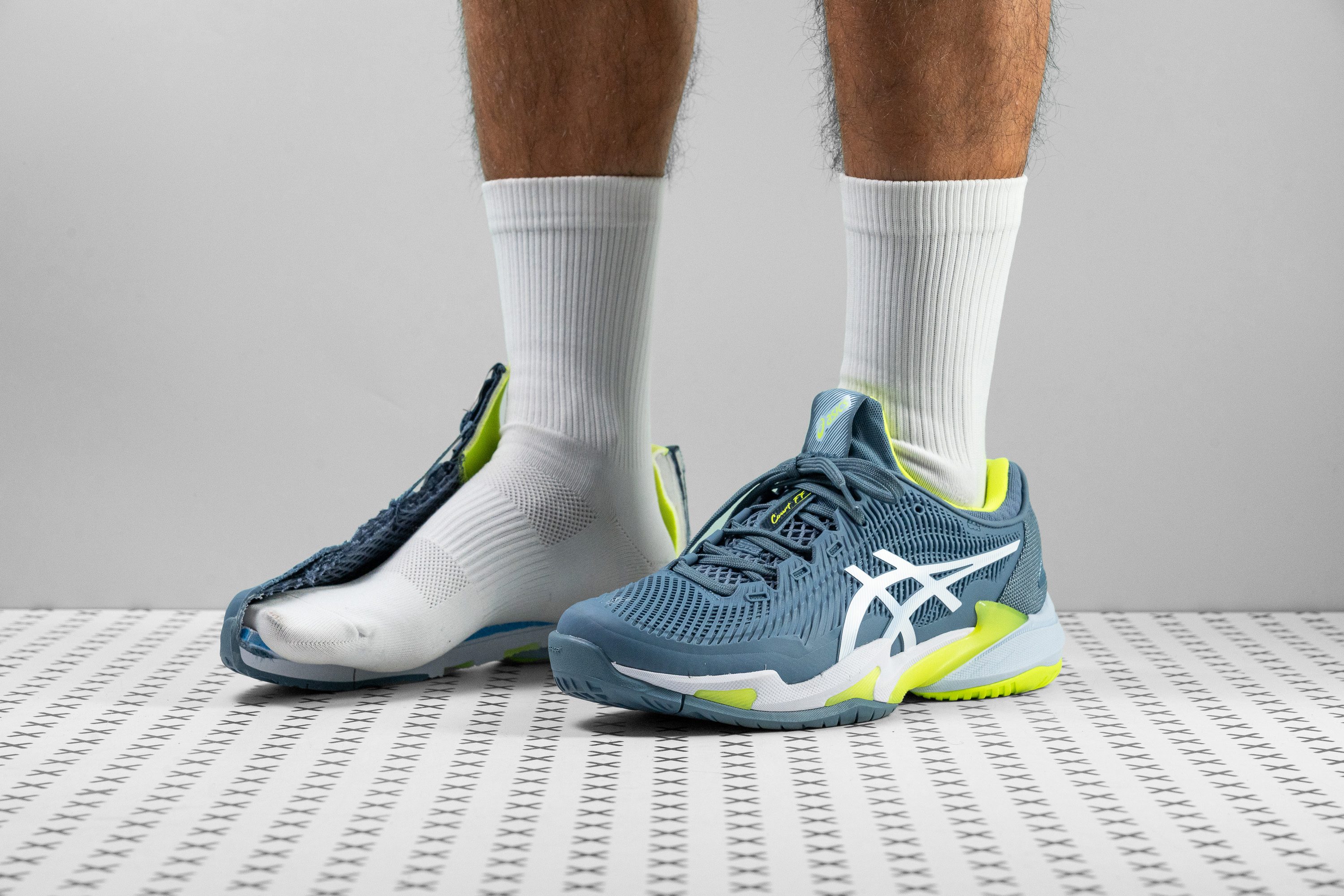
















































What makes it the best?
The tennis shoe that remarkably confronted the unforgiving surface of hard courts during the multi-hour wear tests we performed is the ASICS Court FF 3. Every skid, slide, shift, and halt in this shoe couldn’t be more effortless and risk-free.
What kept us planted on the hard court despite agile movements was the rigid heel counter. This checked out with the subjective assessment we did for the heel counter. It endured our pinching and twisting, gaining a score of 4/5 in stiffness.
With grip, we are hands-down impressed. We found the ripple design of the outsole is really effective in keeping us in control of our sideway actions. We also gauged the hardness of the outsole using our durometer to be 85.3 HC, which is around the average outsole hardness and only 2.2% softer. In our games, this ensured both outstanding traction and robustness.
The toughness of the outsole of Court FF 3 was also apparent in our actual games. After hard-core tennis playing, the outsole showed no sign of wear and it remained intact. Additionally, our Dremel only caused a shallow 0.4 mm cavity on the outsole, which is right around the average. However, we would still find it more comforting to know that it has a durability guarantee, except it doesn’t. So, if this is one of your requirements in tennis shoes, we advise skipping Court FF 3.
Pros
- Top-notch abrasion resistance
- Excellent impact protection
- Unmatched foot containment
- Exceptionally stable platform
- Fantastic grip and sliding
- Very comfortable in-shoe feel
- Very comfortable in-shoe feel
Cons
- Lacks breathability
- Not for wide feet
- High price
Best tennis shoes for speed
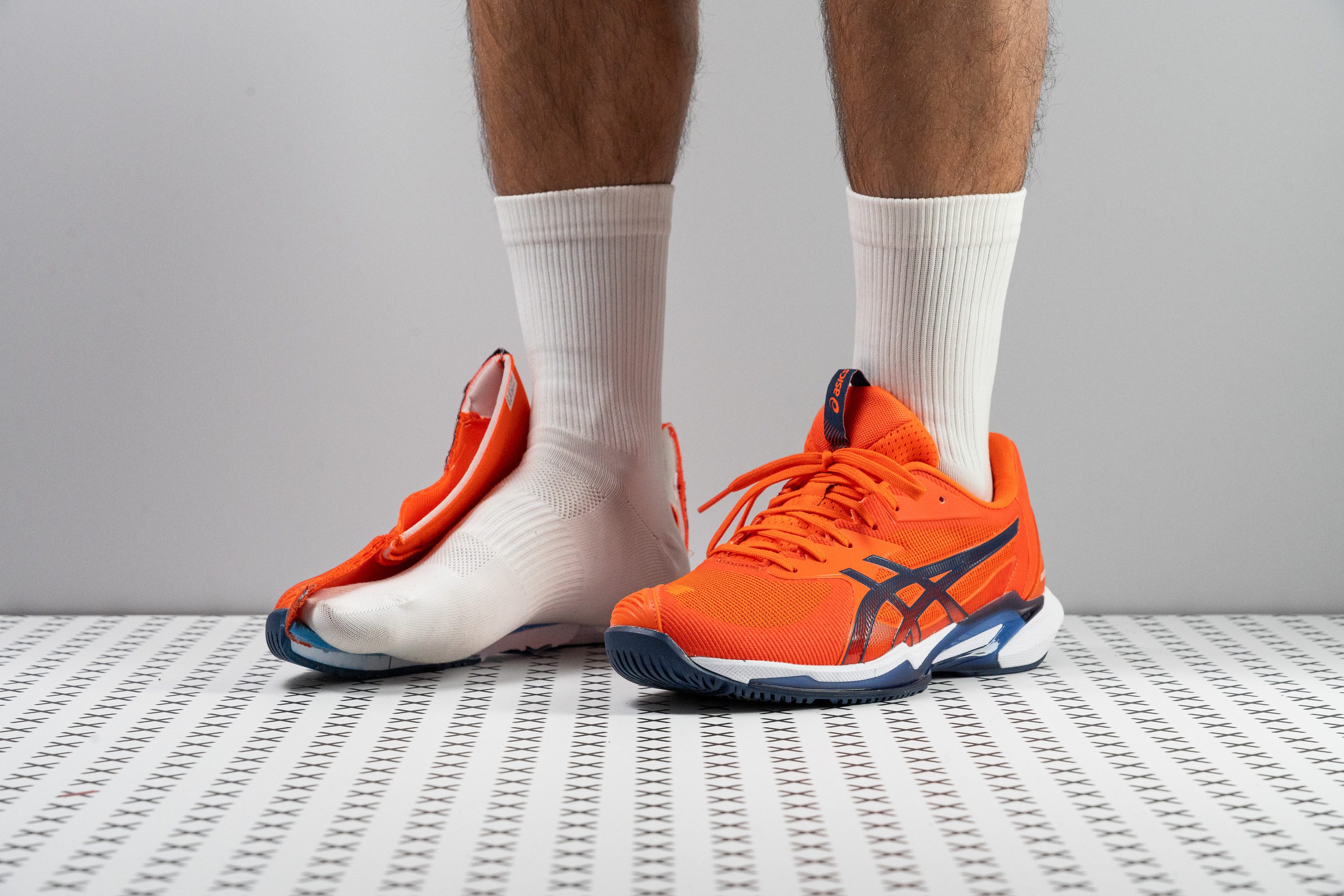















































What makes it the best?
Solution Speed FF 3 lives up to its name as the ultimate speed tennis shoe for hard courts, offering agility and responsiveness for dynamic movements. We can effortlessly keep up with this demanding sport, as our lab confirms the exceptional control, grip, and durability the shoe brings for peak performance.
The shoe feels barely there during our matches, with its ultralight 10.9 oz (309g) build. Other than its weightlessness, the responsive FlyteFoam cushioning provides solid ground connection, allowing us to move in a quick and agile manner. Our durometer reveals the foam is a balanced 31.5 HA, enhancing stability and propulsion in our strides, together with the Speedtruss shank that adds stiffness to the right areas.
The Precision Sole delivers reliable traction, keeping us surefooted through sudden direction changes and micro-adjustments. Our durometer reveals its durable 84.0 HC outsole, which aligns with our experience since the shoe looked pristine after extensive testing.
Remarkably, the shoe withstands friction from all angles, with its toebox and heel earning perfect 5/5 ratings in durability. Despite its durability, the upper maintains breathability, earning a perfect 5/5 rating. This solid combination is extremely rare, but Solution Speed FF3 made it happen.
However, players with wide feet may find the narrow forefoot uncomfortable. Best to check shoes with a more accommodating fit.
Pros
- One of the lightest tennis shoes on the market
- Fantastic wear resistance and durability
- Exceptionally breathable for a tennis shoe
- Grounded platform with a great court feel
- Rockered heel makes transitions faster and smoother
- Solid stability for a speed-oriented shoe
- Perfect grip with enough give
- Perfect grip with enough give
Cons
- Not for wide feet
- Not very stable for baseline players
Hard court tennis shoes with the best stability
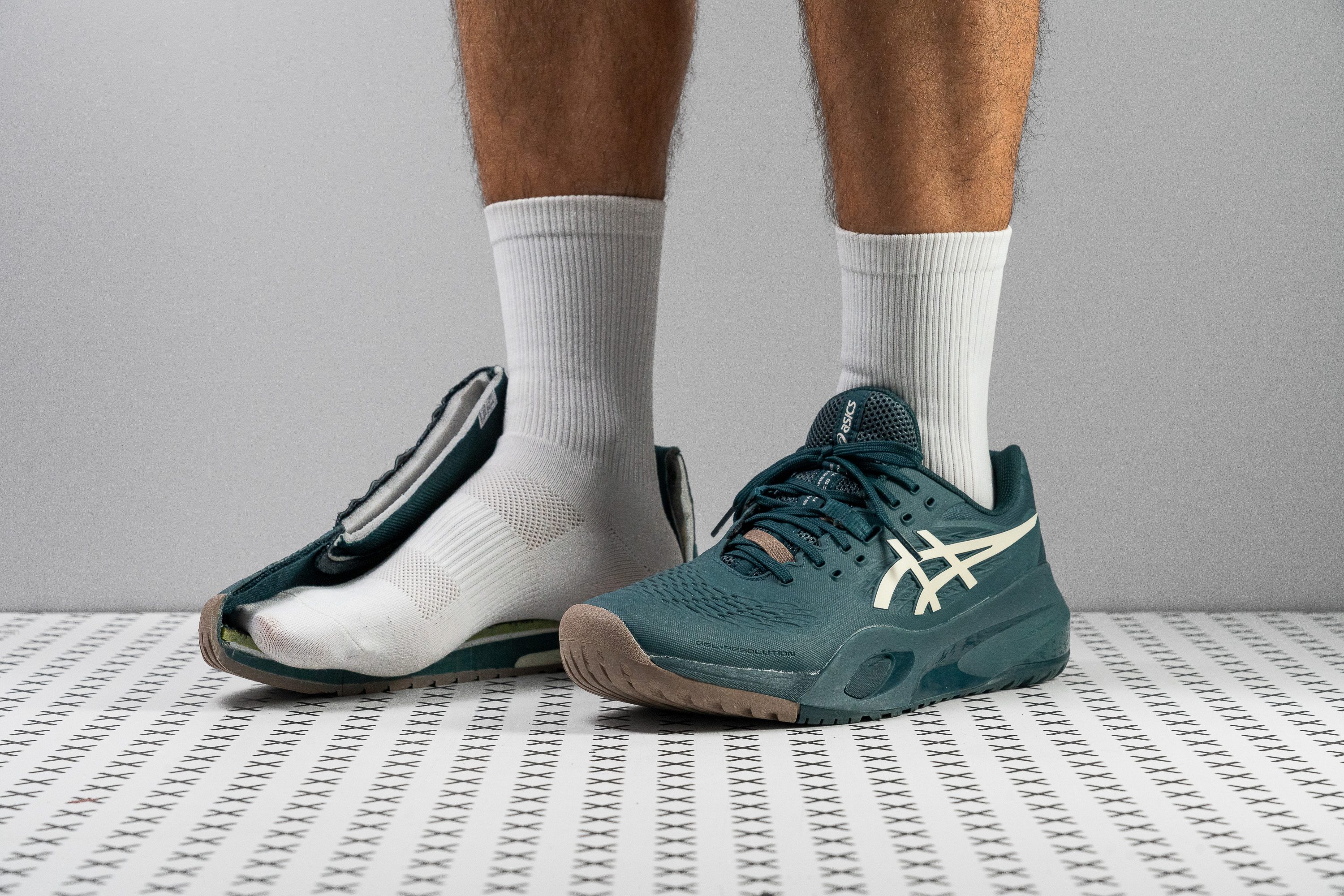















































What makes it the best?
Countless tennis matches in the ASICS Gel Resolution X tell us it’s ready for the baseline grind, hard landings, and abrasive surfaces. In the lab, we confirmed that it offers a joint-friendly experience and solid wear resistance. But what really made it stand out is its exceptional support, making it our best stability hard-court tennis shoe.
We felt so secure inside the shoe because the TPU Dynawall frame held our feet in place, together with the stiff heel counter (5/5). Twisting our ankles was out of the picture even during quick lateral steps because of the midsole’s high resistance to excessive side-to-side movements, proven by its maximum 5/5 torsional rigidity rating.
With every hard landing, the midsole took care of our muscles, especially under the balls of our feet. In our shock absorption test, the forefoot impressed with 70 SA, showing 11.1% more shock absorption than average.
When we slash and drag the shoes on a hard court, they remain intact. We tested further using our Dremel and both the PGuard on the medial side and the toebox impressed with the maximum 5/5 durability score. Even underfoot, the outsole showed less wear than average, cementing its tough construction.
Unfortunately, Gel Resolution X failed to impress in terms of energy return. Players seeking a dynamic underfoot experience should look for a more responsive pair.
Pros
- Unbeatable durability
- Impeccable stability and support
- Perfect for wide feet
- Customizable Dynalacing
- Fantastic outsole traction
- Great impact protection
- Energy return is better than in v9
- Generously padded interiors
Cons
- Unusual fit and sizing
- Raised collar is a mixed bag
- Long break-in period
- Heavier than most tennis shoes
Hard court tennis shoes with the best energy return
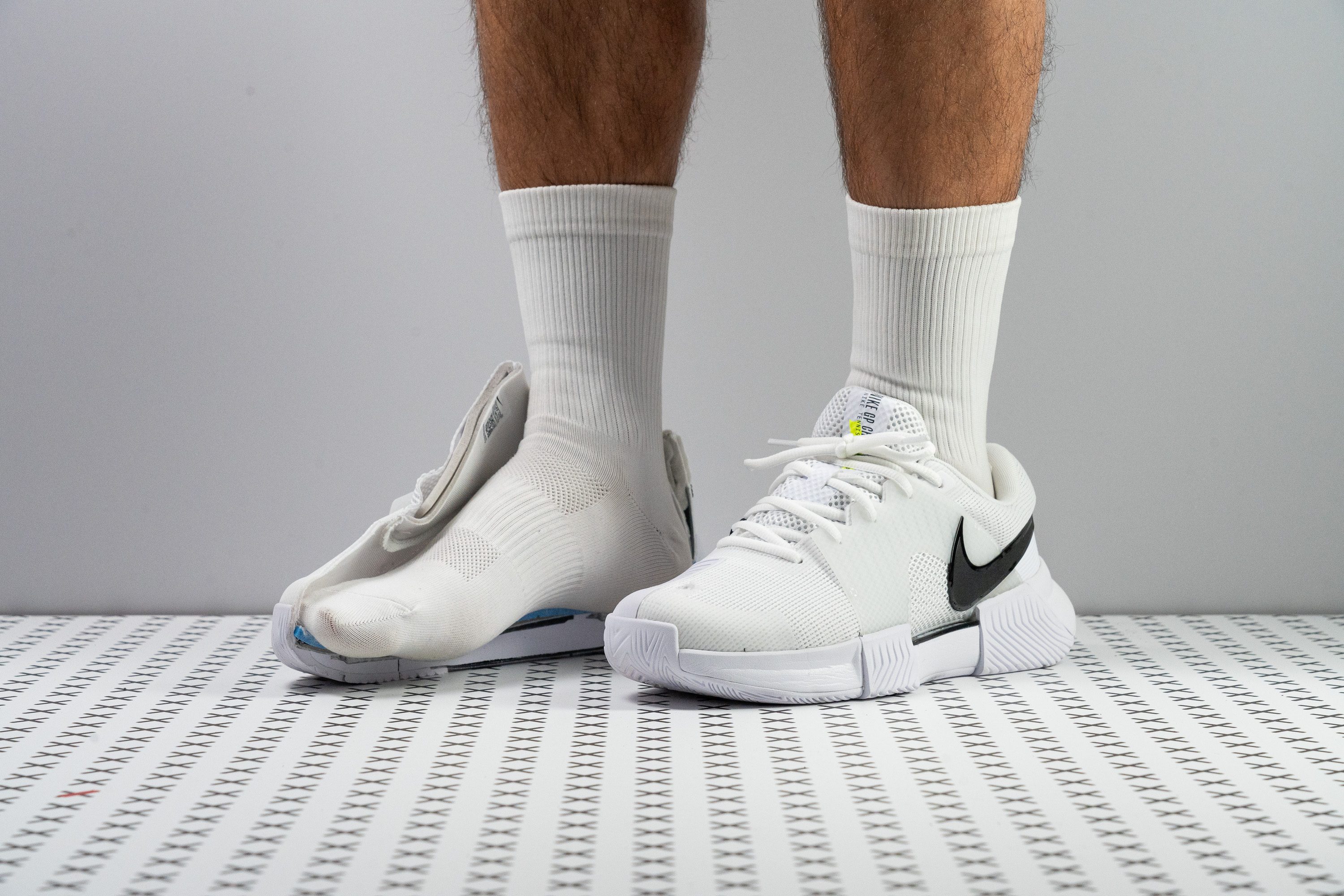



















































What makes it the best?
When the conversation turned to energy return, we could not think of anything else besides the Nike Zoom GP Challenge 1. This shoe’s Zoom units just delivered impressive amounts of energy return, fueling our side steps and forward lunges on the court. We were also impressed by this shoe’s twist resistance and amazingly secure heel clasp.
We could say that the Zoom GP Challenge 1 had energy in its DNA. Aside from the Zoom units, the shank embedded in its midsole also provided high levels of springiness that undoubtedly enhanced the efficiency of our steps.
Foot twists are painful, and we would want to avoid it as much as possible. Good thing that the base of this Nike tennis shoe was stiff and twist-resistant. We gave it a good twist in the lab, and elected to give it a perfect 5 for torsional rigidity.
The heel counter also contributed a lot to our surefootedness. It securely embraced our rearfoot, giving no space for wobbles and other forms of instability. The 4 out of 5 that we gave the heel counter for its stiffness was pretty much well-deserved.
The weight of this shoe, though, could still be improved. At 14.71 ounces (417g), the Nike Zoom GP Challenge 1 was a lot heavier than the average tennis shoe which would weigh only 12.84 ounces (364g).
Pros
- Excellent lateral support and stability
- Highly responsive and bouncy cushioning
- Great impact protection
- Stiff shank adds lots of propulsiveness
- Rockered heel makes heel-to-toes smoother
- Very durable and thick outsole
- Cosy step-in feel
- Strong grip on hard court
Cons
- Heavier than average
- Not enough protection for toe drags
- A bit fiddly tongue
Hard court tennis shoes with the best shock absorption
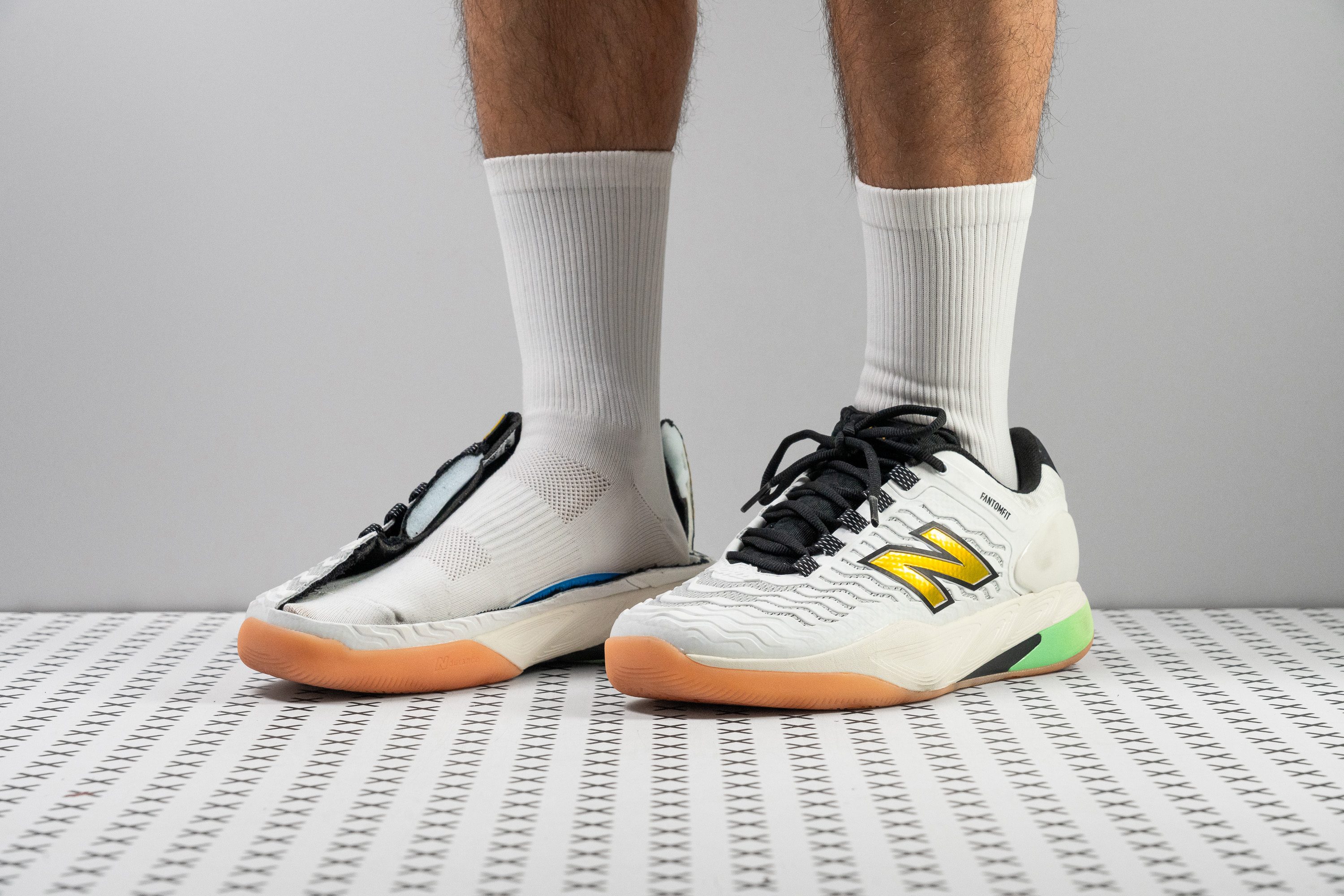











































What makes it the best?
Despite long hours on the hard court, the New Balance Fresh Foam X CT-Rally v2 assures zero chances of our legs feeling shot by offering the best shock absorption in the hard court category. Our lab tests confirm what our legs appreciated, the CT-Rally v2 offers a good mix of comfort and support, allowing us to put all our attention to the game.
We’re amazed by how protective the midsole feels without being too thick. Our calliper shows the heel is an above-average 33.3 mm, while the forefoot is a more moderate 20.2 mm, but it feels cushioned even for heavier players or those with foot pain. Our shock absorption reveals why: the heel recorded an impressive 116 SA rating and the forefoot a solid 78 SA score, meaning it reduces muscle strain better than average.
We felt highly stable and surefooted, even as we performed hard dashes and aggressive lateral movements. The combination of the Fantomfit technology and the stiff TPU in the midsole offers strong multi-directional support. The Fantomfit has 6 webbed eyelets for contained foot movement and a secure fit.
Meanwhile, the shank supports our midfoot and ankles from spilling over. This reinforcement is evidenced by CT-Rally v2’s maximum torsional rigidity score of 5/5.
However, this tennis shoe focuses more on cushioning and stability than responsiveness. Those who prefer more liveliness underfoot should go for shoes with higher energy return.
Pros
- Outstanding shock absorption
- Heavenly step-in comfort
- Fantastic lateral support and stability
- Perfect medium fit with wide width options
- Impressive upper durability
- Balanced grip and give
- Excellent lockdown and containment
Cons
- Heavier than average
- Low toebox height
- Low breathability
Best hard court tennis shoes for beginners
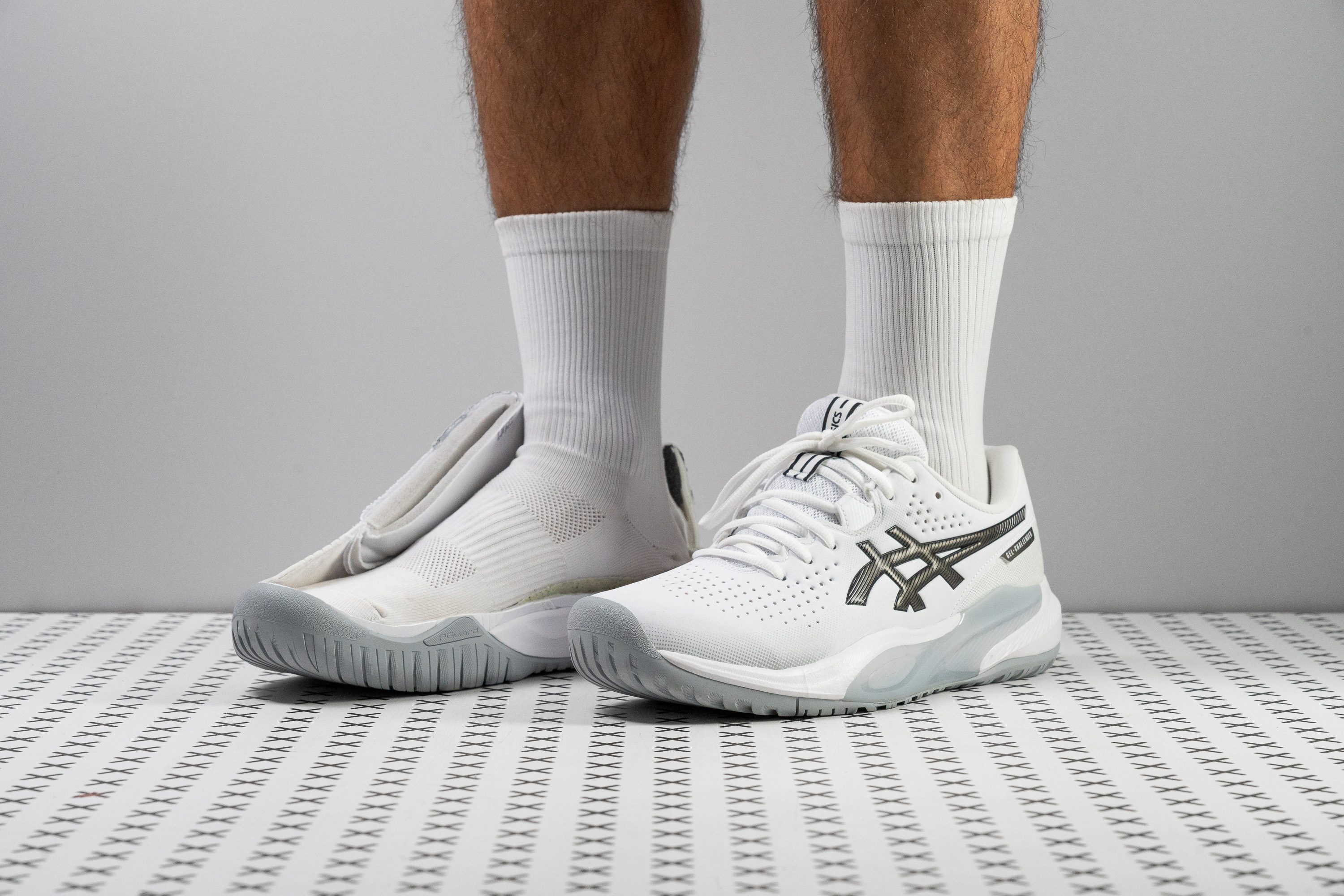












































What makes it the best?
Offering serious stability in a premium-level package, the ASICS Gel Challenger 15 offers support and durability beyond its £110 price. Its firm foothold grabbed our attention during playtests, while its surprising all-around durability blew us away in the lab, making it our top hard court tennis shoe for beginners.
Our cut-in-half midsole reveals the shoe’s WINGWALL design, which works together with the firm and wide base to boost our surefootedness. Gel Challenger 15 highly resists twisting with its stiff midsole (5/5) and its sturdy ankle support. We pinched the heel counter, and it had no give, so we awarded it the maximum 5/5 stiffness rating.
The broad platform also adds to our well-planted footing, measuring 115.0/94.9 mm vs. the 111.8/89.6 mm standard.
When it was time for gliding and toe dragging on hard court, the shoe gave us no reason to worry since it smashed our Dremel test in all areas. From the PGuard toe drag (5/5), the toebox (4/5), the heel (5/5), and the outsole (0.6 mm dent), Gel Challenger 15 exceeded the norm in terms of wear resistance.
However, the platform has minimal shock absorption. Therefore, we can’t recommend it to players with joint pain, foot conditions, or those needing extra cushioning against landing impact.
Pros
- Uncanny value for money
- Unbelievably stable ride
- Much wider and steadier base
- Great outsole grip and give
- Fantastic durability for the price
- Accommodating fit
- Generously padded interiors
Cons
- Massive weight gain
- Minimal shock absorption
- Not very breathable
Best budget hard court tennis shoes
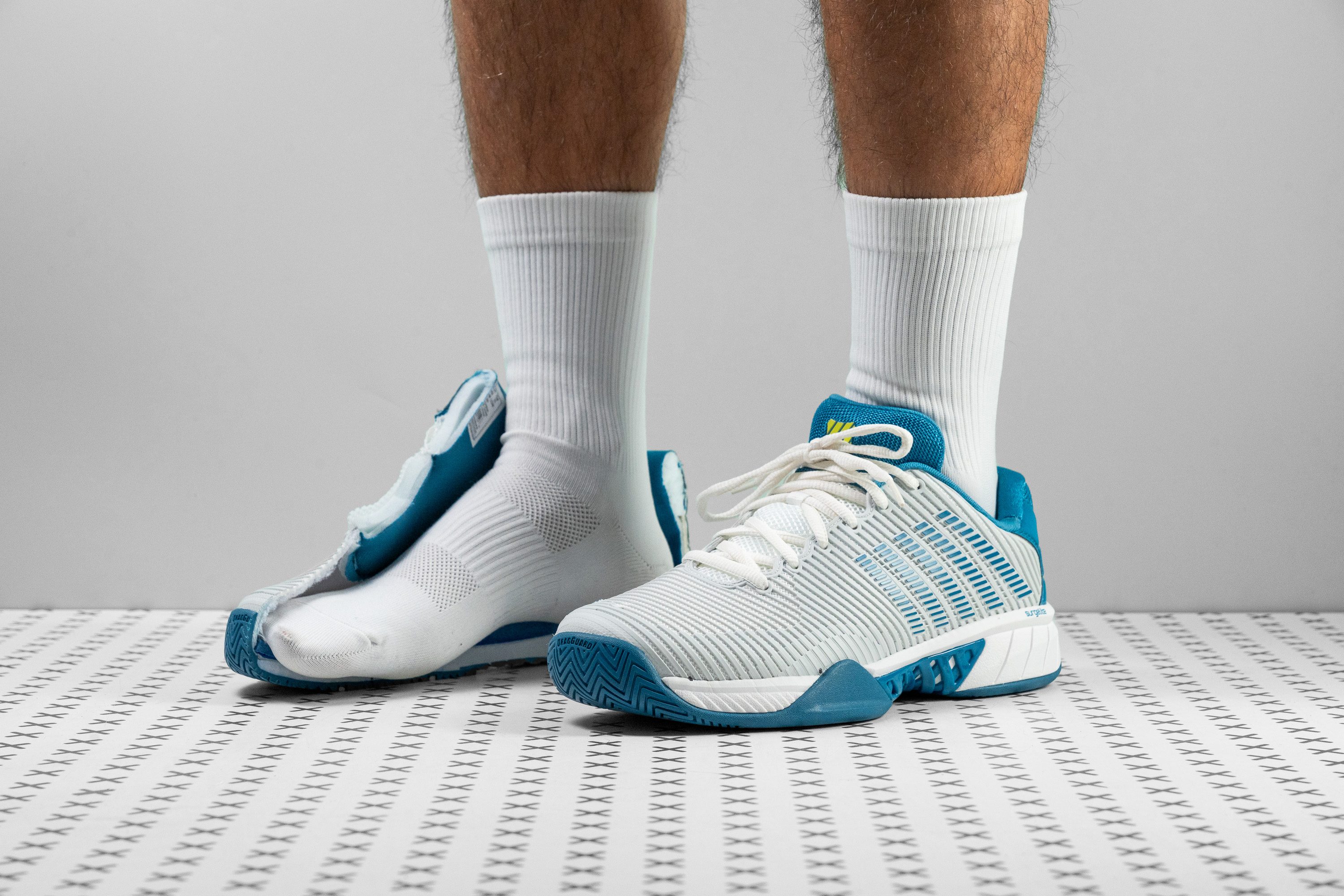















































What makes it the best?
Claiming victory in the best budget section of hard-court tennis shoes is the K-Swiss Hypercourt Express 2. Because of this affordable yet marvellous pair, we are spared from the joint stress and pressure caused by playing on hard courts. It’s valued at £110, which we discovered to be 13% more affordable than the typical tennis shoes.
We were able to move with ease in all directions and the fantastic tread made it possible. No incidents of tripping and slipping occurred when we were sporting the Hypercourt Express 2, which speaks volumes given that we performed quickly on our feet.
Despite the shoe’s economical price and after being abused on hard courts, we didn’t detect any thinning out or decline in quality in the outsole. Bonus is it’s also non-marking. Unfortunately, we discovered that narrow footers might not fully enjoy it due to its roomy fit. We suggest either sizing down or going for a snugger pair.
Pros
- Light and nimble on the feet
- Mind-blowing durability for the price
- Well-balanced soft cushioning
- Wide and stable platform for a speed shoe
- Excellent grip and give
- Amazing in-shoe comfort
- Ideal for wide feet
Cons
- Lacks breathability
- Not for narrow feet
Good to know about hard courts
Before we look at the shoes, it’s helpful to understand the court surface they are designed for.
Very common surface: Hard courts are arguably the most popular of the tennis court types and are also the most commonly played on surfaces, not only amongst amateurs but also on the professional tennis tour.
It is abrasive: Hard courts are made out of an asphalt or concrete base that is coated with different materials and therefore can be seen in a range of colours, green and blue being the most common. From a distance the surface appears silky smooth but up close it is rather abrasive. Most hard court tennis shoes are white in appearance, but this type of surface can accommodate any colour.
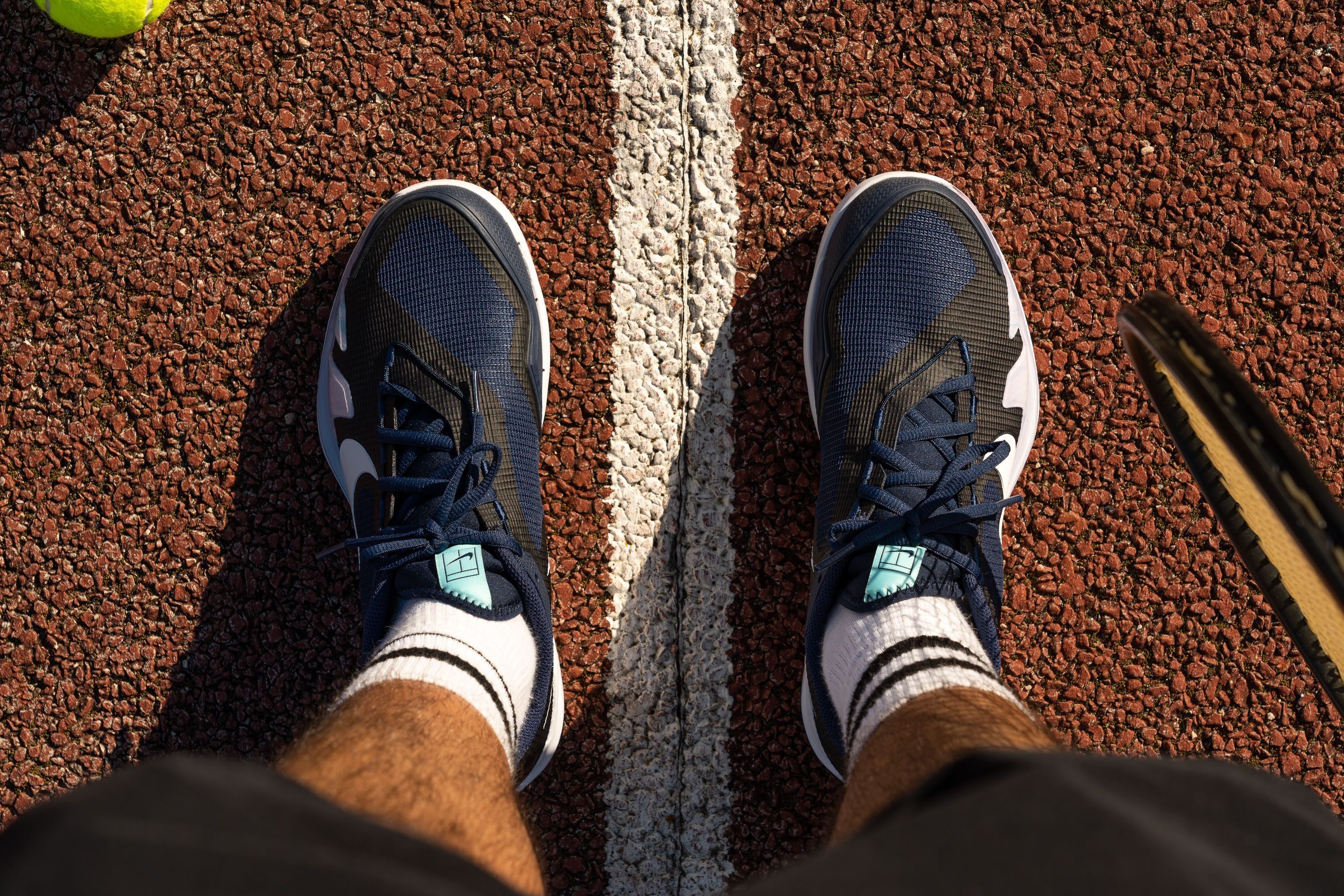
Harsh impact: While clubs benefit from such a durable surface, players need to be wary - hard courts can be relatively harsh on the body as the surface does not absorb impact as much as clay or grass. This is where a good choice in footwear, ideally a pair of hard court specific tennis shoes - pays dividends.
It’s fast! Hard courts are generally considered fast because the ball moves significantly quicker on a hard court than on a clay court, but not as fast as a grass court. Your shoes will need to be able to support your quick reactions accordingly.
Predictable ball movement: The ball bounce on a hard court is high but consistent, with less spin than clay courts, but more so than grass courts. This combination makes it easier to predict the ball’s trajectory and therefore makes it popular for beginners just learning how to play tennis right through to professionals training for an up-coming tournament.
Easy maintenance: Many local tennis clubs, large and small, enjoy the benefits of hard courts for their long-term durability, versatility and ability to keep clean and maintained easily. Likewise for your shoes; hard court tennis shoes are known as the easiest to maintain.
Hard court (HC) vs. clay court (CC) shoes
The primary difference between hard-court and clay-court tennis shoes lies in their outsole design which is conditioned by the court surface they were made for.
|
Hard court (HC) |
Clay court (CC) |
|
|
Court characteristics |
made of concrete or asphalt, covered with an acrylic top |
made of crushed brick, stone, or shale |
|
tough, faster game, higher traction, harder on the body and shoes |
soft, slower game, less traction (can get slippery), easier on the body and shoes |
|
|
Shoe outsole |
multi-directional tread pattern allows for both grip and sliding; thicker and more durable treads |
full herringbone pattern allows sliding and doesn’t collect dust from the court |
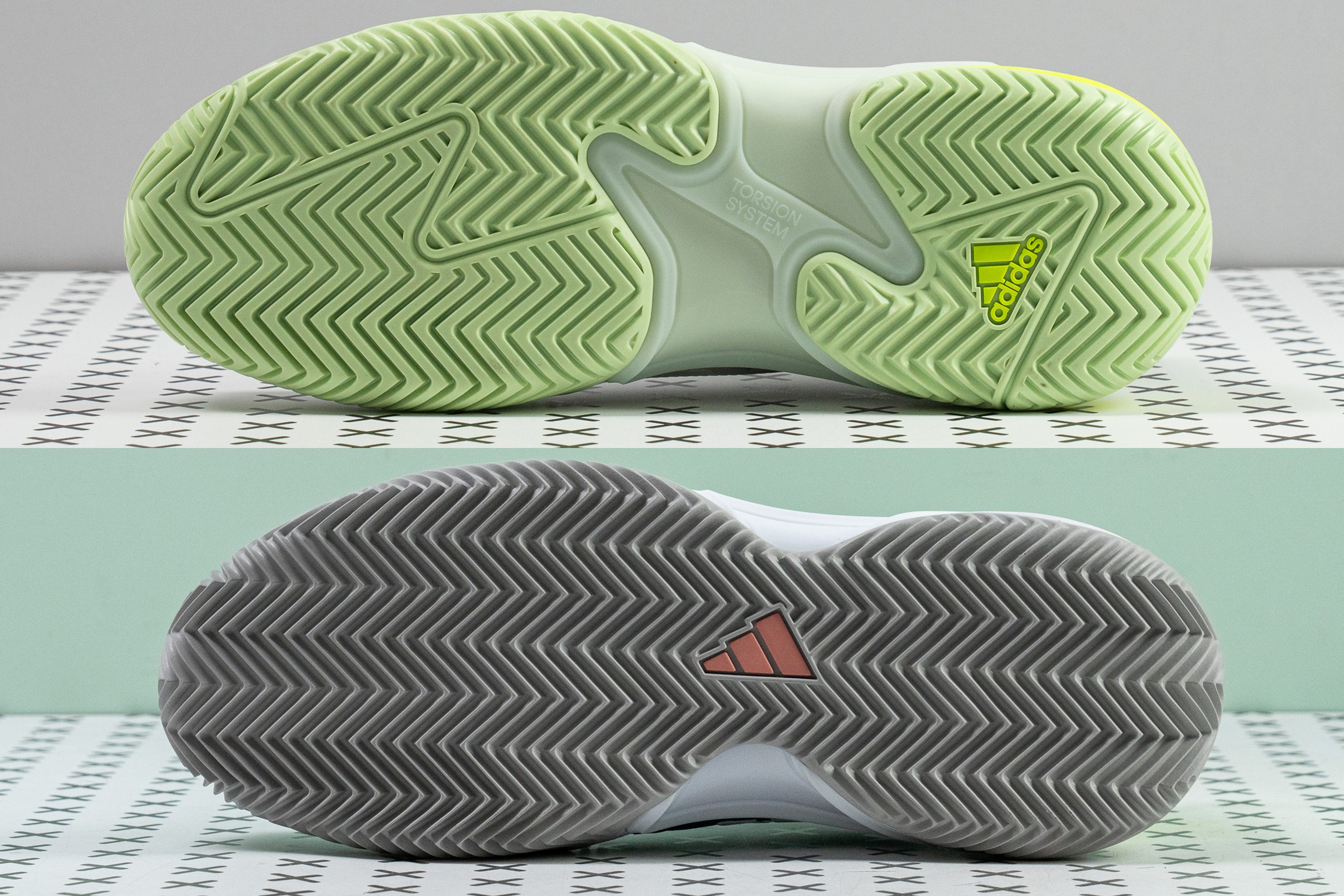
You can get away with wearing a clay-court shoe on hard court and vice versa but only for a game or two. For regular use, it is advisabe to get a court-specific shoe because:
- Clay-court shoes wear out too fast on hard courts. Also, their herringbone pattern is notably tackier which makes it more difficult to slide and is hard on the ankles and joints.
- Hard-court shoes lack the thinner and deeper treads for solid grip on more slippery clay courts. They also get more easily clogged with clay dirt.
What about All Court (AC) shoes?
Sometimes brands use the HC and AC labels interchangeably to highlight a given shoe’s versatility for various courts. So you can confidently use an AC shoe on hard courts.
Beginner and recreational players might as well use AC shoes on clay courts as long as their tread patterm is not too flat and smooth.
How to find a durable tennis shoe for hard courts
Hard court tennis shoes are created to withstand the most abrasive playing surface. That’s why durability is paramount in this type of tennis shoes.
To check the potential longevity of each shoe, we perform several durability tests involving a Dremel and a sandpaper tip in our lab.
We keep the Dremel speed and pressure consistent for comparable results.
Outsole durability
A tennis shoe outsole always takes the biggest hit as it constantly stays in contact with the court.
No wonder major athletic brands provide a 6-month outsole durabililty guarantee for their most advanced tennis shoes. It implies a free exchange for another pair in case the shoe’s outsole rubber rubber gets worn all the way to the midsole foam in less than 6 months.
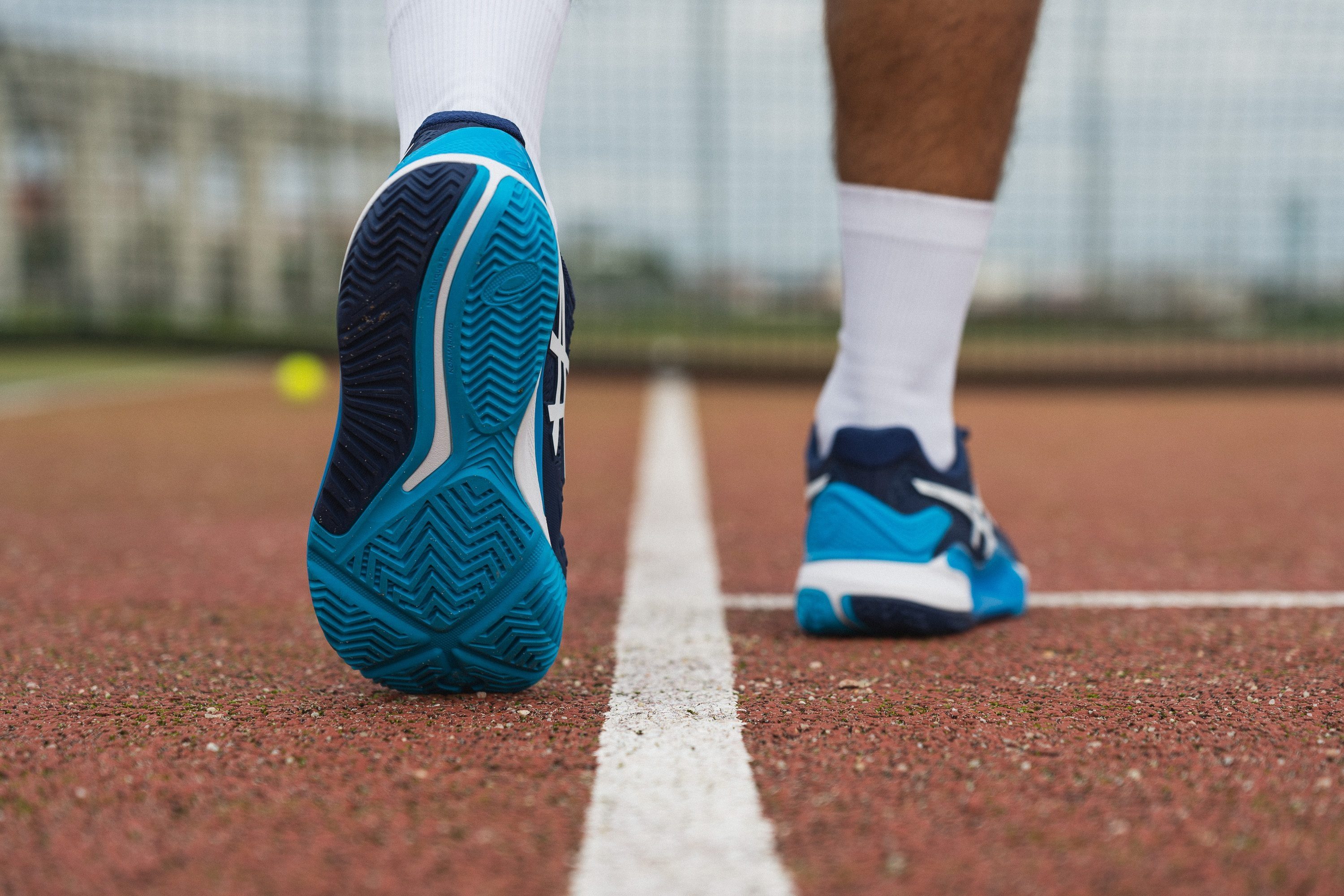
In our lab, we attempt to predict each shoe’s outsole longevity by measuring the following parameters:
- thickness (using a digital calliper)
- abrasion resistance (using a Dremel, a sandpaper tip, and a tread gauge)
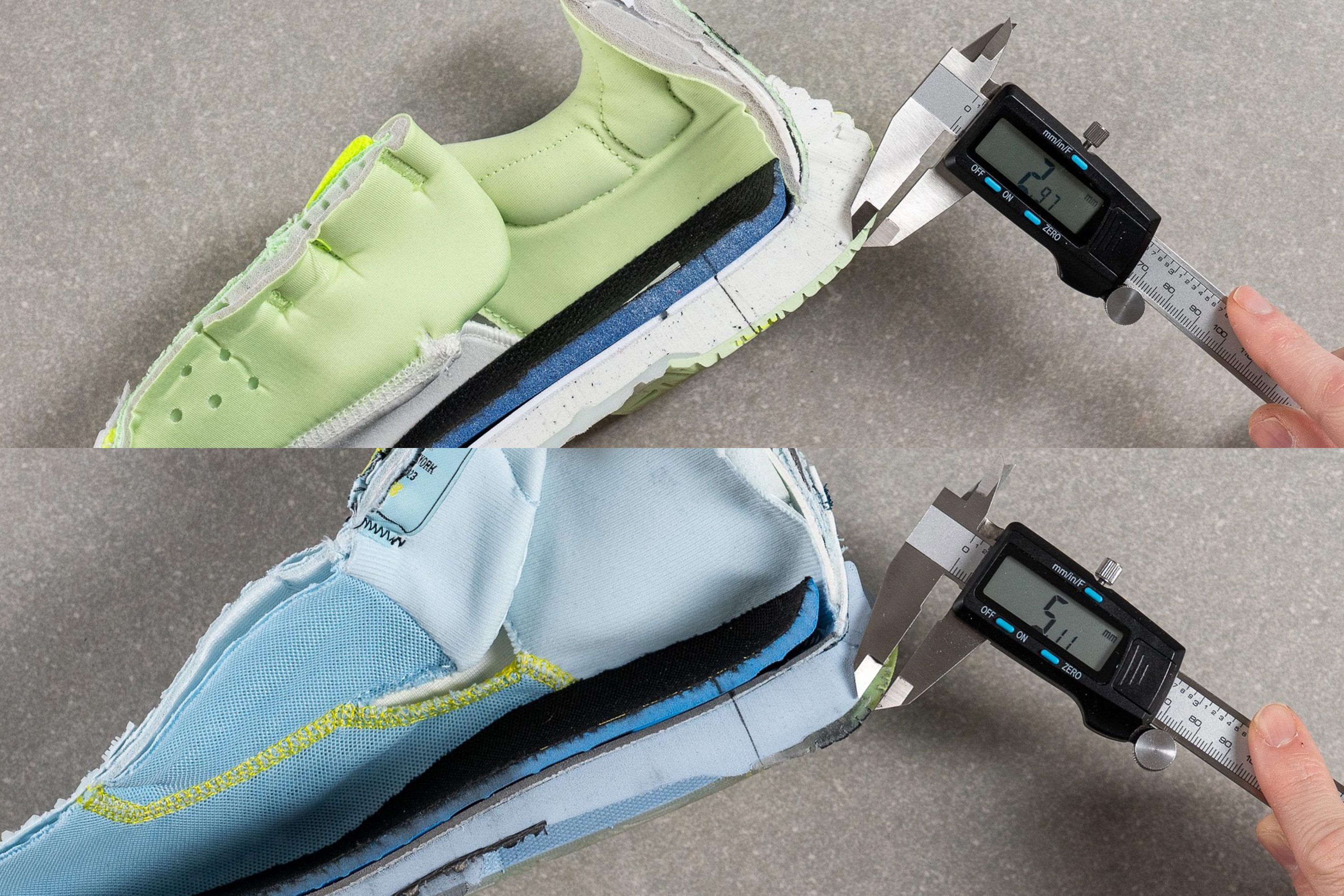
Thicker outsoles take much longer to wear out. To test abrasion resistance, we apply the Dremel to the outsole at a high 10K RPM speed and measure the dent it left in the rubber with a tread gauge.
The shallower the damage, the better the durability.
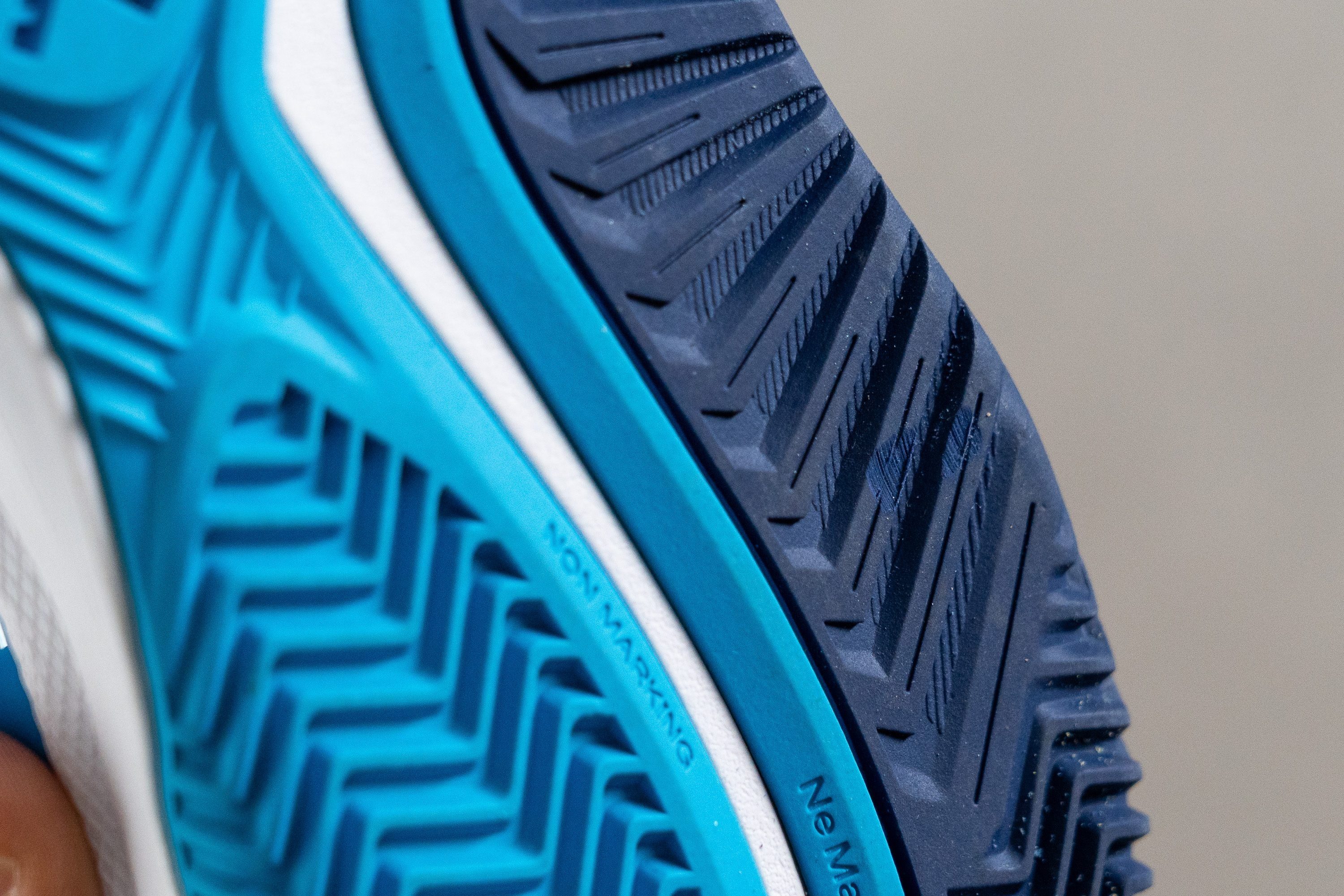
Here is the overview of hard court tennis shoes with the most durable outsoles.
We also included each shoe’s retail price (MSRP) to show you that it’s not always the most expensive shoes that have the best durability.
Toe drag guard durability
Another part of a hard court tennis shoe that sustains the most brutal wear and tear is the toe drag guard. Especially if it’s worn by an aggressive slider.
A drag guard is found on the inner side of the shoe’s forefoot section and, in some models, it also covers up the eyelets for enhanced protection.
But not all tennis shoes have the same level of toe reinforcement.
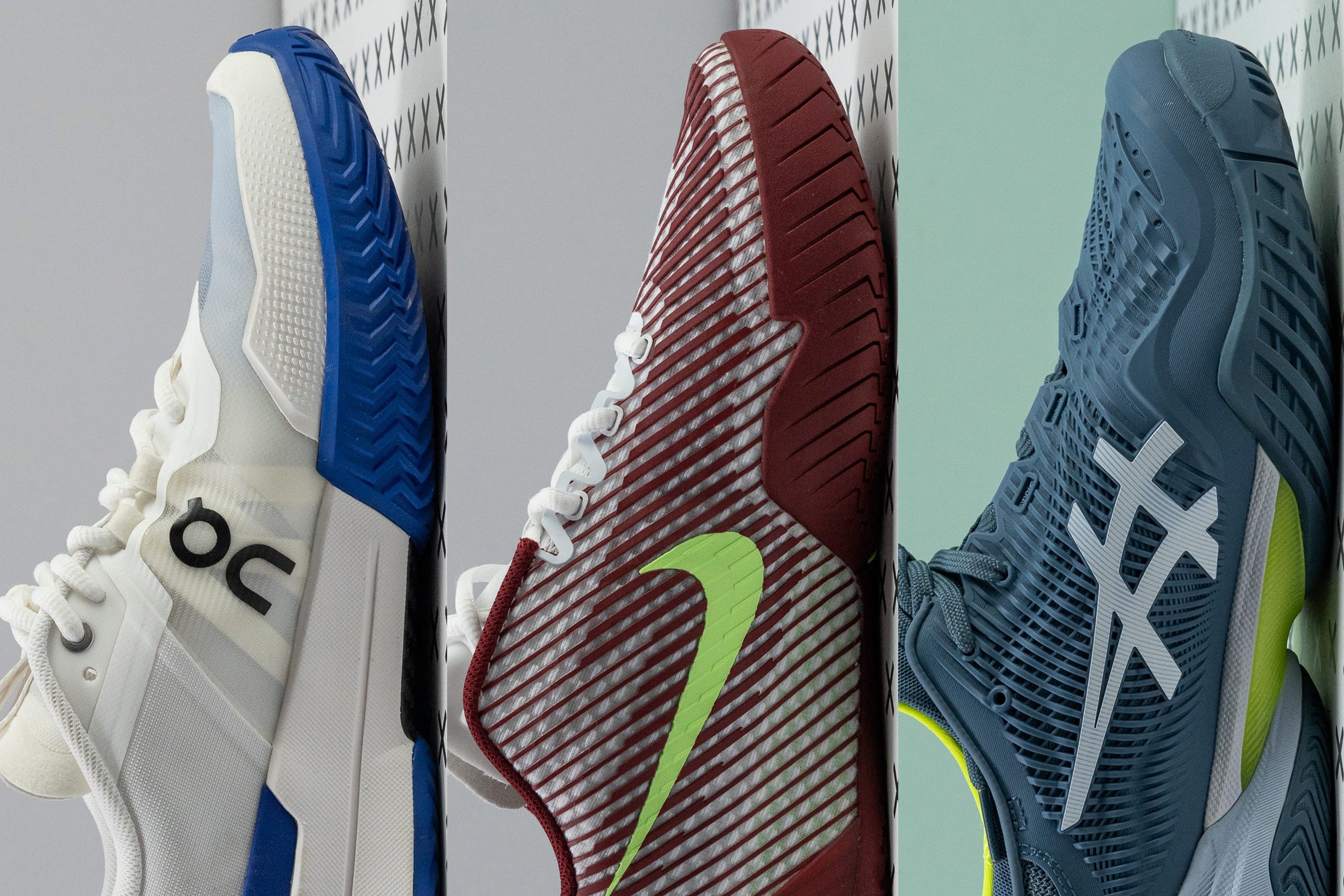
We test each shoe’s toe drag guard in the same conditions as the outsole because it is often made of the same rubber.
Assessing the severity of damage, we rate each shoe’s toe drag guard durability on a 1-5 scale (5 being the most durable).
Toebox durability
The toughest hard court shoes use rubber and plastic overlays all around the toebox to keep it protected from court slashes.
But most tennis shoes (especially lighter and speed-oriented shoes) only put a piece of rubber on the high-wear area leaving the rest of the toebox fabric exposed to wear and tear.
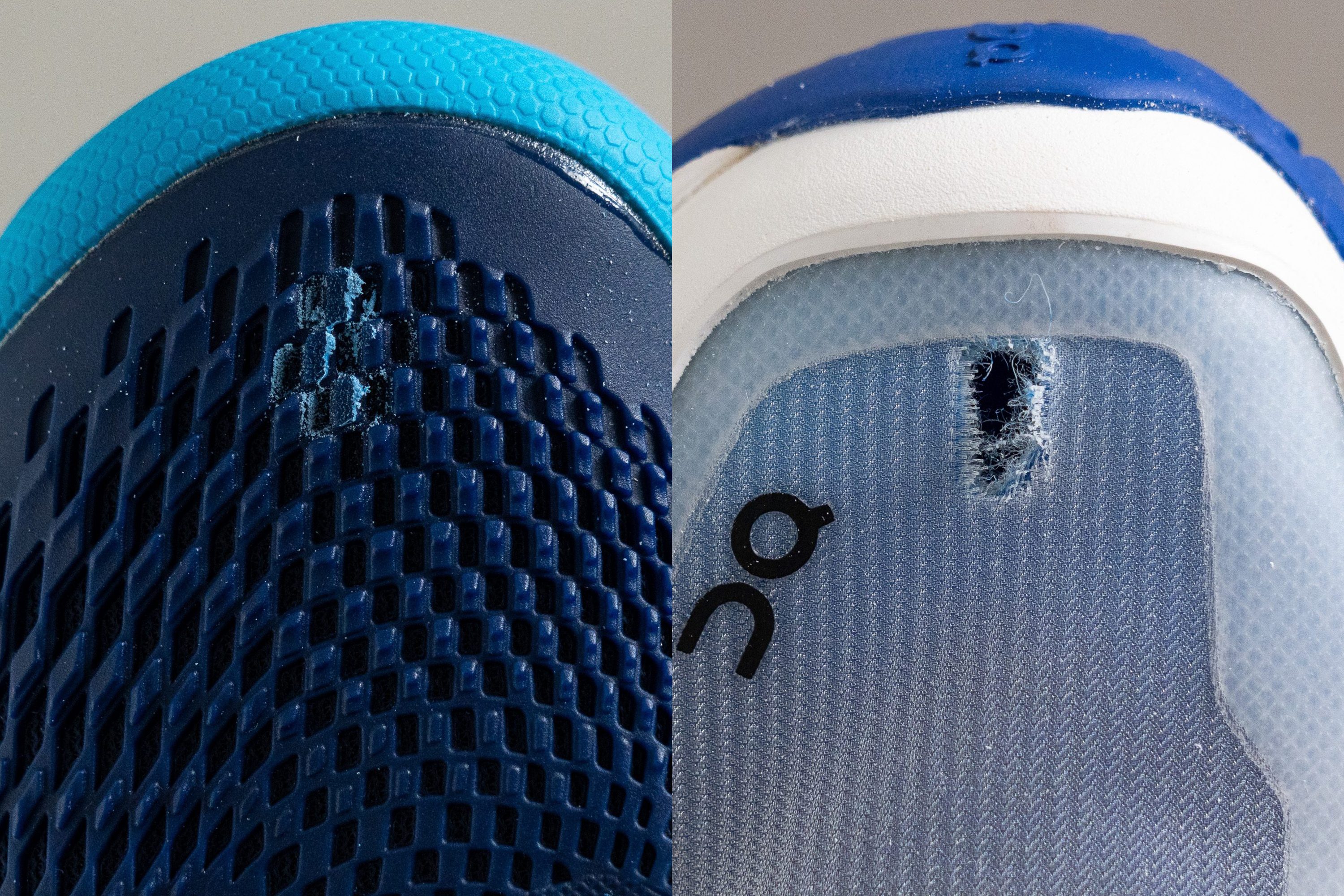
In our Dremel test, we apply sandpaper to the exact same spot on top of the toebox in all tennis shoes for consistency.
Then we rate the toebox durability on a 1-5 scale, where 1 is a total see-through hole and 5 looks like the the shoe was barely touched.
Heel padding durability
Even though the most brutal abrasion occurs externally, we also pay attention to the durability of each shoe’s inner lining.
Intense and dynamic movements of tennis can be pretty hard on the inside of your shoes too! Because once you blow through the fabric that lines the interiors, it can lead to major discomfort and even hot spots and blisters.
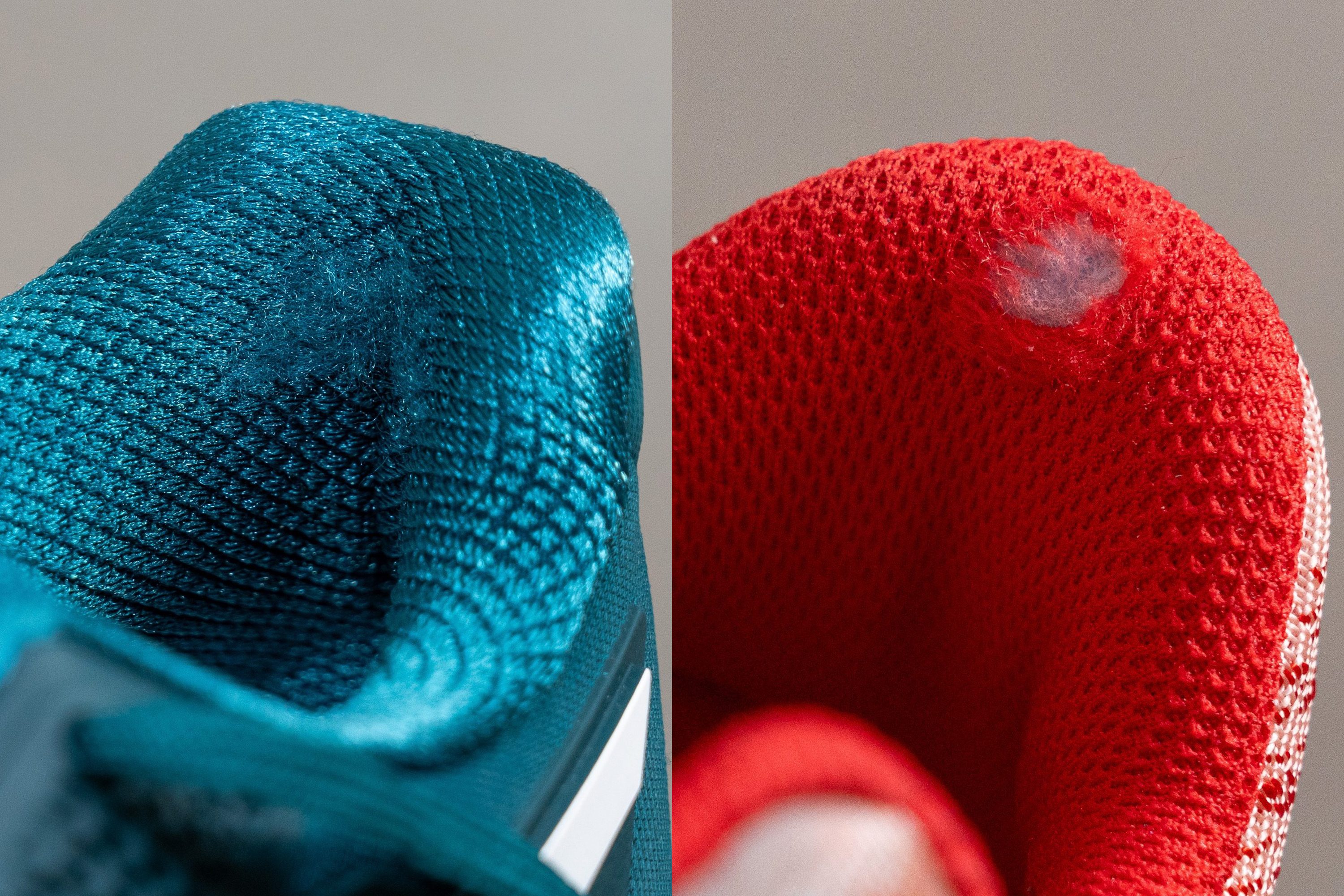
Considering the more delicate nature of this shoe part, we lower the Dremel speed to 5K RPM and apply the sandpaper for only 4 seconds to be able to see the differences in wear-resistance more clearly.
Cushioning durability
Even though we don’t have a test for cushioning durability just yet (in development), we want to emphasise its importance as well.
It’s easy to see when your tennis shoe’s upper or outsole start to deteriorate - you see holes, tears, and missing chunks of material. But the loss of cushioning cannot always be spotted visually - it can only be felt.
Here are a few telltale signs that your hard court shoe has lost its cushioning properties:
- the shoe feels firm and pancake flat underfoot, there is no give or bounce
- your feet and knees feel notably more fatigued after the match
- the midsole feels more compressed in some areas
To catch cushioning degradation early on, we recommend having at least two shoes in your rotation (a newer one and an older one) so that you can feel the difference.
Good shock absorption is important
Repetitive pounding on hard surfaces tends to build up and, over time, takes a toll on the player's feet, joints, and overall body.
So if you want to protect yourself from excess stress, overuse injuries, and feel comfortable during long rallies, it's worth checking the shock absorption of your future pair of tennis shoes.
To let you know exactly how much impact protection to expect, we take each tennis shoe through an ASTM F1976 test to measure its shock absorption both in the heel and forefoot.
Our extensive lab data showed that tennis shoes with 95-105 SA readings in the heel provide an optimal amount of cushioning and are a safe bet for most athletes. But if you need more, consider shoes with measurements above 105 SA.
Hard court tennis shoes for every playing style
Some players move all over the court and need a lighter and nimbler shoe to accommodate their agile playing style. Others need more substantial footwear to support their forceful lateral shifts at the baseline.
Based on the type of movements they cater to, all hard-court tennis shoes can be roughly divided into two categories - speed shoes and stability shoes.
Speed tennis shoes
|
Best for |
Shoe features |
|
agile all-court players |
|
These nimble shoes are suitable for players who spend most of the game on their toes, flexing more easily with the foot. They also provide a better sense of connection to the court.
Speed shoes have notably sleeker designs, fewer upper overlays, and no obtrusive stabilisers on the sides to keep the player as light on their feet as possible.
The average weight of hard-court tennis shoes hovers around 12.8 oz (365g) while speed-oriented shoes range from 10.5 oz (300g) to 12.5 oz (355g).
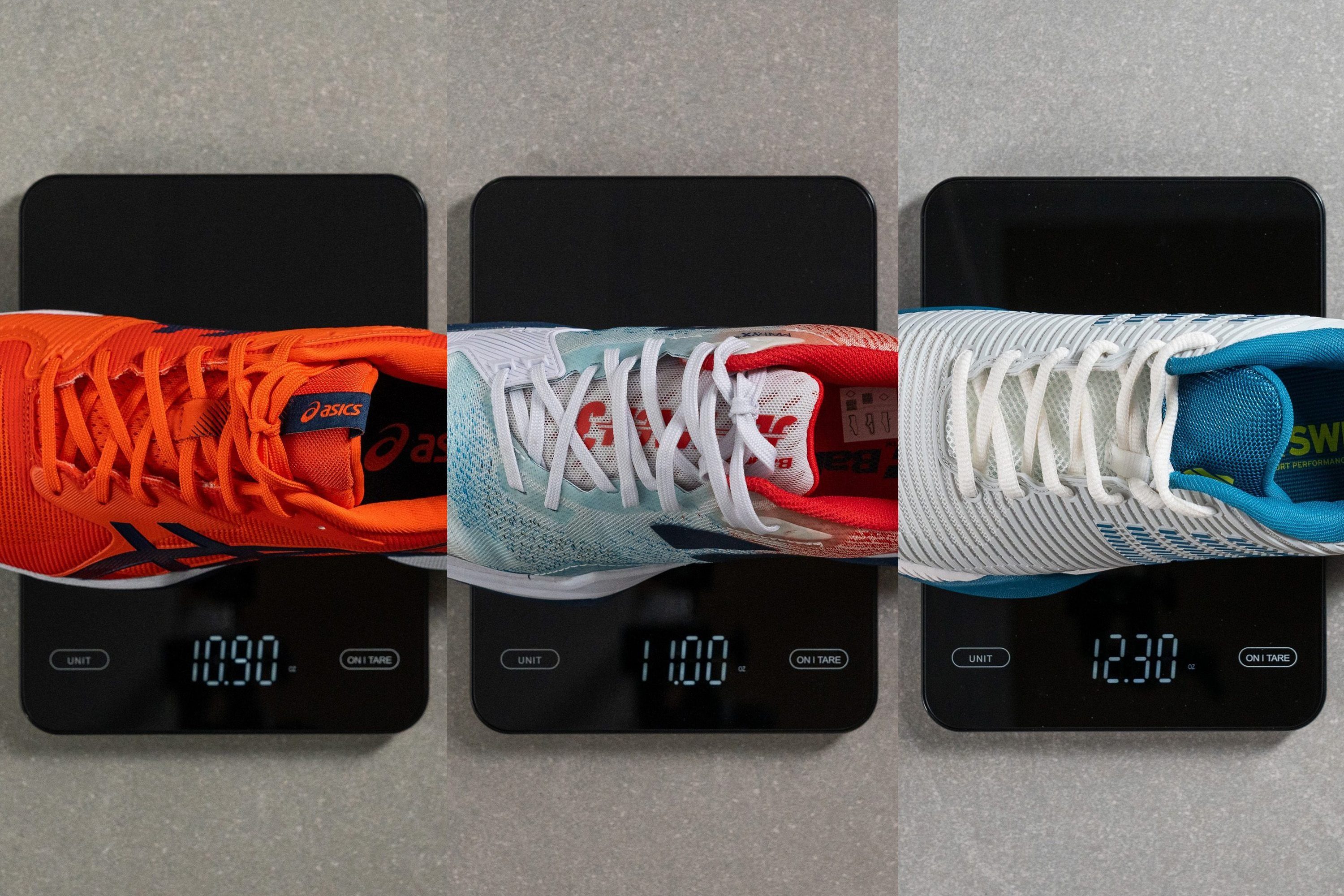
Stability tennis shoes
|
Best for |
Shoe features |
|
|
Stability shoes are designed for tennis players who rely on extra support for aggressive side-to-side movements.
Considering that lateral ankle sprains are the most common type of injuries in court sports, both professional and beginner players can benefit from a supportive shoe that minimises the risk of ankle rolls.
Stability-oriented tennis shoes are easy to recognise by their stout TPU walls on both sides of the midfoot as well as supportive elements around the heel. Most of these shoes also have stiff shanks embedded into their midsoles.
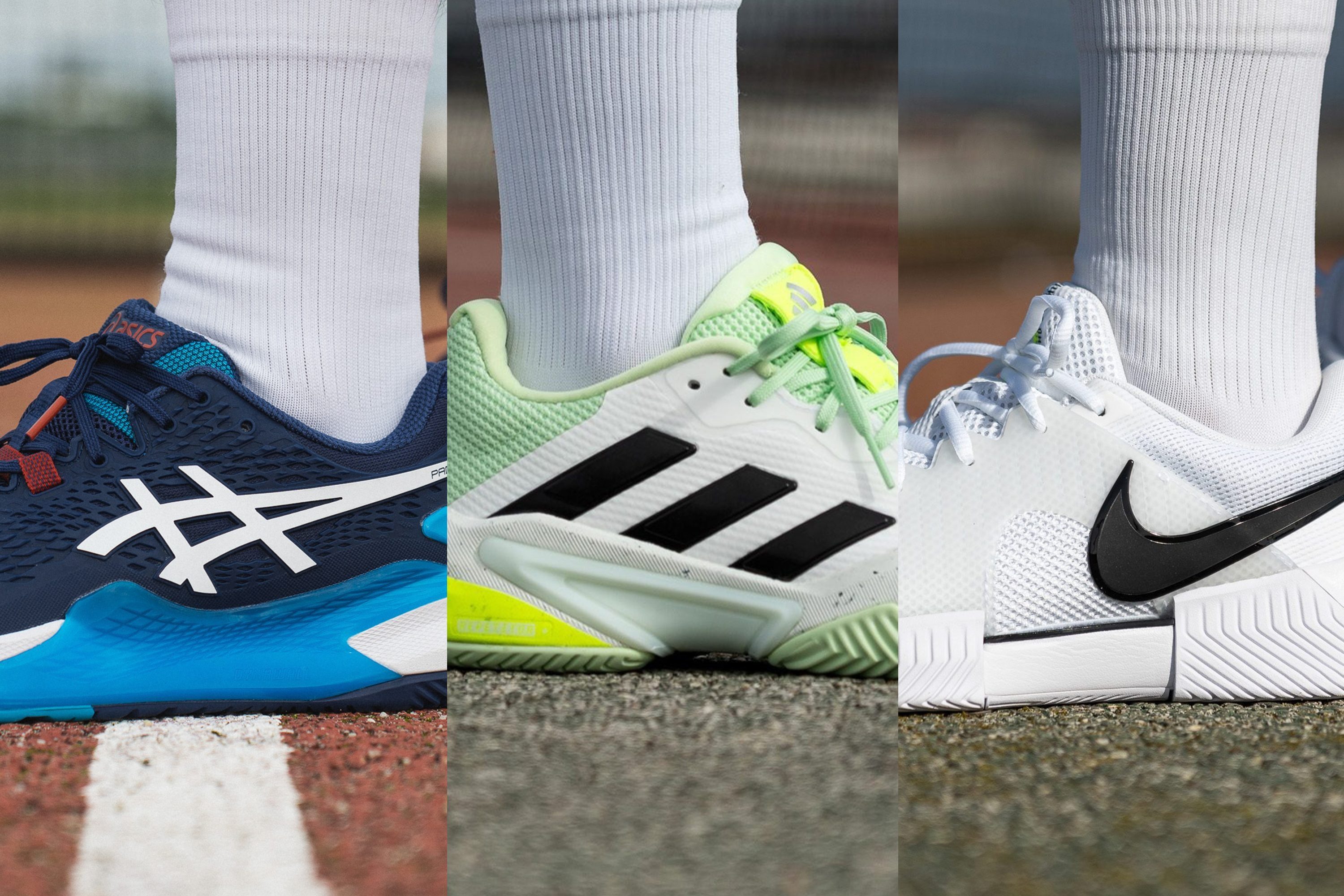
When combined, all these components create a lot of torsional rigidity which can be felt by twisting the shoe with your hands.
Stability shoes also have pretty stiff and structured heel counters with generously padded collars to lock the rearfoot securely in place.
These shoes also have notably wide platforms with protruding lateral flanges, offering a stable landing and push-off base.
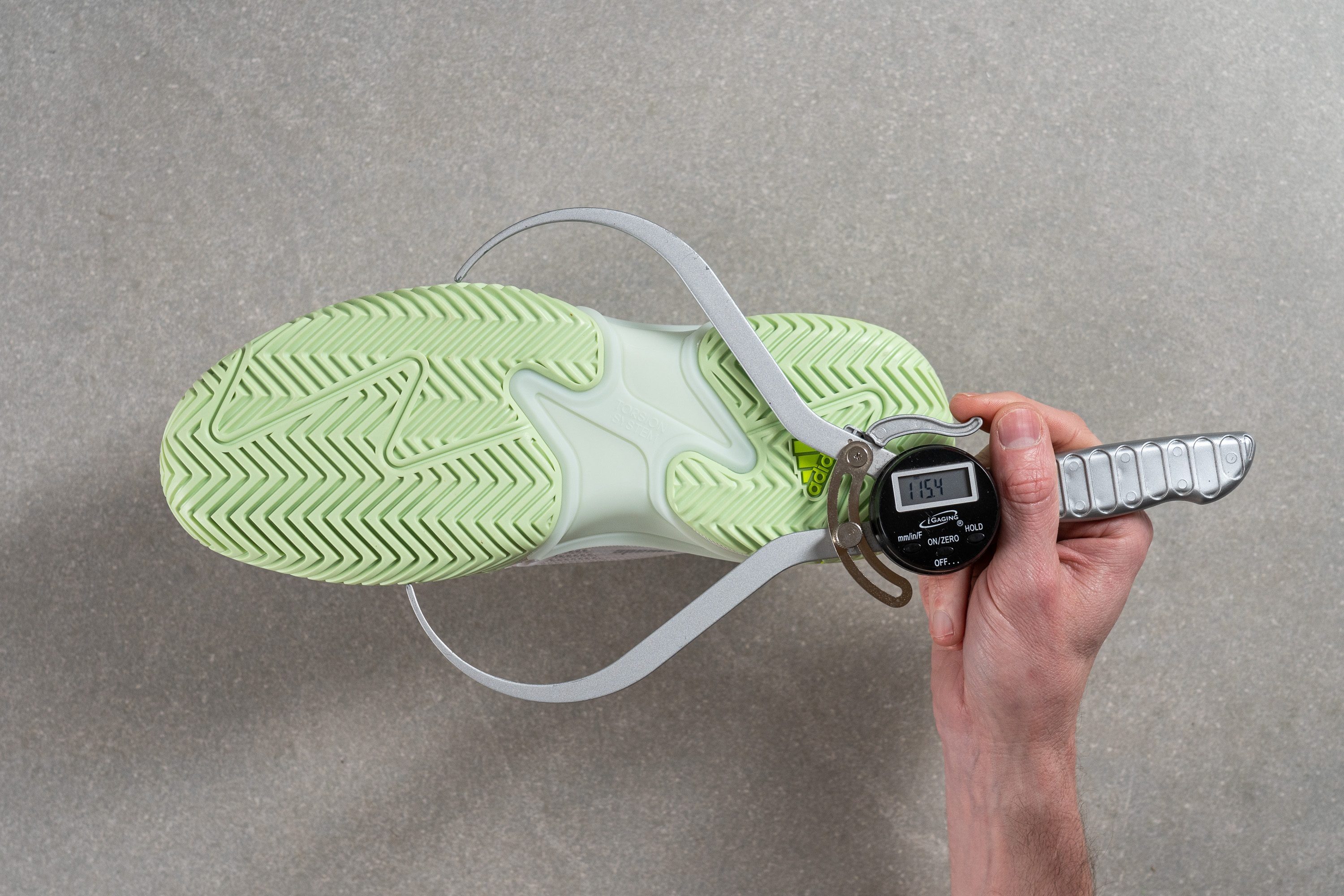
Hard court tennis shoes with the best traction
A grippy outsole is essential for keeping you surefooted throughout the entire session. That's why we meticulously measure each tennis shoe's gripping capacity in our traction test following the SATRA TM144 methodology.
Our testing machine mimics a stopping motion of the foot and records the coefficient of friction that's generated by the shoe's outsole in the forefoot. The higher the friction, the tackier the traction.
We found that the range of 0.70-0.85 is normal for hard-court tennis shoes, especially if you prefer a balance of grip and give. Because more traction doesn't necessarily mean a good thing as it can put more stress on the lower extremity joints.
But if you are after that tacky experience, opt for shoes with a friction coefficient of 0.85 or more.

